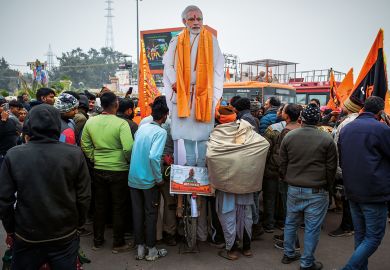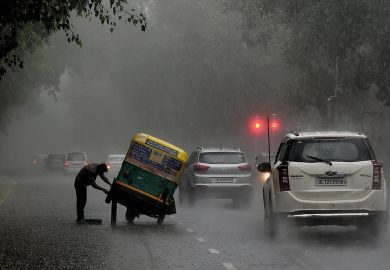Last week’s letter by Indian vice-chancellors accusing opposition politician Rahul Gandhi of spreading falsehoods about their appointment was the first time that higher education has figured in the campaigning for India’s general election – and it might well be the last.
The letter, signed by 181 current and former university leaders, claimed they had been “defamed” by Gandhi’s allegation in April that their appointments had been political rather than meritocratic. According to The Times of India, Gandhi, the former Congress party president, said in Hindi that Indian vice-chancellors were “all [Rashtriya Swayamsevak Sangh] people” (referring to the paramilitary Hindu nationalist organisation closely linked to the ruling BJP) and “have no idea about education”.
The vice-chancellors countered that Gandhi was trying to “derive the political mileage” out of his “baseless allegations” and called for “appropriate” legal action to be taken against him.
But the vice-chancellors’ move only enhanced perceptions that they are indeed working as BJP agents. If they were really concerned about the Indian higher education system, they should instead be pushing back against the BJP’s suppression of academic freedom. They should be calling on the various parties to pledge to respect universities’ autonomy if they win the election, which runs until 4 June. Currently, academic autonomy is not on the agenda of any political party.
During the past few years, especially after the implementation of the National Educational Policy in 2020, drastic changes have been made in India’s higher education system. Governance of universities is moving towards a centralised system over which government will have larger control. For example, the existing University Grants Commission (UGC) is to be replaced by a new regulator whose approval universities will have to seek for each academic programme they offer.
“This law is an attempt to take away the statutory powers of the universities,” said Rajiv Ray, president of the Federation of Central University Teachers Association, when the draft Higher Education Commission of India Bill was unveiled in 2018. “The Act and Statute of each university give full academic autonomy to the institution. But that autonomy is going to be undermined.”
The legislation hasn’t yet been introduced to parliament but, if and when it is passed, even Indian’s most elite higher education institutions will be autonomous in name only. Indeed, that may occur before the bill is even passed; with practically every new regulation the UGC introduces, universities, both central and state-run, lose a bit more of their autonomy.
For instance, admissions to both undergraduate and postgraduate courses will soon be determined by a Common University Entrance Test that will be conducted by the National Testing Agency (NTA), a government body. This will deprive universities of the discretion, for instance, to make offers to students from states where educational standards are lower or to members of marginalised communities. It will also, in effect, remove their control over syllabus and course structure since they will no longer be able to judge entrants’ likely success – via a bespoke entrance exam – for a course that differs from national norms.
It is a similar story for doctoral admissions. The UGC announced in April that, from 2024/25, universities will no longer be allowed to hold entrance exams for PhD students. Rather, eligibility for doctoral fellowships will be judged on the basis of scores in a new National Eligibility Test – again, conducted by the NTA.
This decision was taken by the UGC when it had just four government-appointed members – instead of the 12 stipulated in its underpinning legislation, of whom eight should be university teachers and at least four still active. Subsequently, four new members have been appointed, but only two are from the teaching community. There were 12 members until June 2022, but now major decisions are being taken with little or no academic input.
Even the elite Indian Institutes of Management (IIM) have seen their autonomy reined in by the IIM (Amendment) Act, passed last year, which gives the president of India power to appoint and remove not only the chairs of their boards of governors but also their directors.
Gandhi may have broached the subject of academic autonomy, but there is only one line in his Congress party’s manifesto about higher education, promising blandly to “consult with the state governments regarding the new education policy and make amendments in it”. None of the other parties appear interested in autonomy either.
There are two possible reasons. One is that all of them are interested in gaining control over higher education institutions. In many opposition-run states, local legislators have been fighting with the BJP-appointed governors for control of universities. The Kerala state government, for instance, recently attempted to pass a bill that would replace the governor as chancellor of the region’s universities and take his power to appoint vice-chancellors.
The second possible reason is that not much noise is being made about autonomy by students and academics. The BJP’s promotion of pseudo-science and the relating of science to religion has promoted a sense that being religiously orthodox is more important than being scientifically rigorous, diminishing the status of academics.
In fact, the absence of intellectuals from the election debate explains why higher education is just one topic affecting the prospects of the country’s youth that is not being discussed at all. In many ways, this is the most unfortunate aspect of a process that will directly affect more than a billion people.
Mukhtar Ahmad is a former professor of electrical engineering at Aligarh Muslim University.
Register to continue
Why register?
- Registration is free and only takes a moment
- Once registered, you can read 3 articles a month
- Sign up for our newsletter
Subscribe
Or subscribe for unlimited access to:
- Unlimited access to news, views, insights & reviews
- Digital editions
- Digital access to THE’s university and college rankings analysis
Already registered or a current subscriber?








